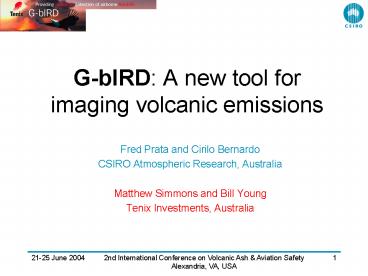GbIRD: A new tool for imaging volcanic emissions - PowerPoint PPT Presentation
1 / 23
Title:
GbIRD: A new tool for imaging volcanic emissions
Description:
GbIRD: A new tool for imaging volcanic emissions – PowerPoint PPT presentation
Number of Views:35
Avg rating:3.0/5.0
Title: GbIRD: A new tool for imaging volcanic emissions
1
G-bIRD A new tool for imaging volcanic emissions
- Fred Prata and Cirilo Bernardo
- CSIRO Atmospheric Research, Australia
- Matthew Simmons and Bill Young
- Tenix Investments, Australia
2
Technical overview
- Principles of infrared imaging
- Ground-based InfraRed Detector - G-bIRD
- Applications
- Examples and Results
- Conclusion
3
Principles
- Passive IR radiation (operating 6-14 µm, nominal)
- Uncooled detector (no need for N2 or mechanical
cooler) - Excellent sensitivity lt200 mK (50 mK for
broadband) - 2D imaging - 320x240 pixels
- 5-channel filter wheel (bandpass selection
optional) - Rapid imaging 5 images per minute
- Day/night operation
- CSIRO patented technology
4
G-bIRD camera
- 50 mm filters
- 5 channels
- Computer controlled
- Algorithms produce calibrated scene temperatures
- Continuous remote operation/low power
5
- Examples
- Deployment at Anatahan, NMI
- Ash detection at Tavurvur, Rabaul
- SO2 detection at Etna and Stromboli
6
Ship-borne measurements at Anatahan volcano
Plume of ash and water vapour
7
Possible deployment site
Possible landing site
8
Rabaul/Tokua Airport - 20 km from Tavurvur
RVO
Old Rabaul airport
Tavurvur
20 km
Tokua airport
9
B Old Rabaul runway
10
E RVO
11
Ash clouds from Matupit village
Ash image
Visible photograph
2003-331-0004 27-November 2003 0654 UTC
12
(No Transcript)
13
Ash clouds at Rababa (10o elevation)
Ash image
Visible photograph
2003-333-0132 29-November 2003 0413 UTC
14
Ash clouds at Rababa (80o elevation)
Ash image
Visible photograph
2003-333-0129 29-November 2003 0355 UTC
15
(No Transcript)
16
Alarm time-series 10 minute samples
Cut-off
17
G-bIRD images
Broadband image
11 µm image
8.6 µm image
8.6-11 µm image (DTso2)
18
Industrial SO2 plume
19
G-bIRD measurements at Etna
- 15 km distance
- SO2 plume
- No ash
- Can distinguish H2O plumes
- from SO2 plumes
20
SO2 from Etna
21
G-bIRD measurements at Stromboli
- SO2 plumes
- Explosions
- Re-suspended ash
22
SO2 from Stromboli
23
Conclusions
- G-bIRD is a new thermal imaging camera for
identifying airborne hazards. - It operates automatically day or night and can be
deployed in remote locations. - It has been tested at 5 active volcanoes (viz.
Kilauea, Anatahan, Etna, Stromboli and Tavurvur). - G-bIRD complements current systems and is a
pre-cursor to the development of an on-board
detector. - Several outstanding problems to overcome (e.g.
water vapour effects, quantifying SO2, viewing
geometry, ruggedisation).































